Before looking at the risks of modern parenting, it is good to define it. Modern parenting is the contemporary approach to raising children that has evolved in response to societal, technological, and cultural changes. It reflects the current attitudes, values, and practices of parents in navigating the complexities of parenting in the modern world. This is a broad definition, so we will go into more detail on what this parenting style includes.
Below are some resources that you can look at as a reference for Modern Parenting techniques on Amazon:

Some key characteristics of modern parenting include:
- Child-Centric Focus: Modern parenting strongly emphasizes meeting the needs and promoting the child’s well-being. Parents strive to create nurturing and supportive environments that foster their child’s emotional, cognitive, and physical development.
- Positive Parenting: Modern parenting often emphasizes positive discipline and gentle guidance rather than authoritarian approaches. It focuses on building a solid parent-child relationship based on mutual respect, effective communication, and understanding.
- Individuality and Autonomy: Modern parents recognize and support their children’s individuality, encouraging them to express their unique personalities, interests, and talents. They strive to foster their child’s autonomy, independence, and decision-making skills.
- Emotional Intelligence: Modern parenting emphasizes emotional intelligence and fosters emotional well-being. Parents seek to cultivate their children’s emotional intelligence by teaching them to recognize and regulate their emotions, empathize with others, and develop healthy coping strategies.
- Work-Life Balance: Modern parents often strive to achieve a healthy work-life balance, seeking to combine their parenting responsibilities with professional pursuits. They aim to create a harmonious integration of their personal and professional lives while prioritizing quality time with their children.
- Technology Integration: With the prevalence of technology in modern society, modern parenting involves navigating the role of technology in children’s lives. Parents aim to balance leveraging technology for educational and recreational purposes while managing its potential risks and promoting responsible use.
- Parental Self-Care: Modern parents prioritize self-care and mental health, recognizing the importance of their well-being. They understand that caring for themselves makes them more present and effective parents.
It is important to note that modern parenting is not a one-size-fits-all approach, and different parents may adopt different strategies and philosophies based on their values and circumstances. Modern parenting is a dynamic and evolving concept that continues to adapt to the changing needs and challenges of parenting in the contemporary world. Like any other parenting approach, modern parenting has risks and challenges. Here are some risks that are commonly associated with modern parenting:

Overexposure to Technology: Children are exposed to technology early in today’s digital age. Excessive screen time and access to the internet can lead to potential risks such as cyberbullying, online predators, inappropriate content, and addiction to technology. Parents must establish healthy boundaries and monitor their children’s technology use to mitigate these risks. Modern parenting relies heavily on technology for entertainment, education, and communication. Excessive screen time and digital dependency can lead to various risks, including sedentary lifestyles, decreased physical activity, social isolation, cyberbullying, and exposure to inappropriate content.

Social Media Influence: Social media platforms can significantly impact children and teenagers. They may face pressure to conform to unrealistic standards of beauty, success, and popularity, leading to low self-esteem, body image issues, and social comparison. Parents must educate their children about responsible social media use and foster a healthy self-image. In the era of social media, parents may compare themselves and their children to carefully curated images and stories shared by others. This can create pressure to meet unrealistic parenting standards, leading to feelings of inadequacy, guilt, and stress.

Information Overload: With easy access to vast information, children can be exposed to inappropriate or misleading content. It becomes crucial for parents to guide their children in discerning reliable sources of information and promoting critical thinking skills. With the abundance of information available, parents can become overwhelmed by conflicting advice and opinions on various aspects of parenting. Sorting through a vast amount of data can be challenging and lead to confusion and decision paralysis.

Parental Burnout: Modern parenting often involves juggling multiple responsibilities, such as work, household chores, and childcare. The pressure to excel in all areas can lead to parental burnout, affecting the well-being of both parents and children. Parents must prioritize self-care, seek support when needed, and establish a healthy work-life balance. Modern parenting often involves juggling multiple responsibilities, such as work, household chores, and childcare. The pressure to excel in all areas can lead to parental burnout, negatively affecting the well-being of parents and children.

Loss of Family Time: Busy schedules and competing demands can reduce quality family time. Modern parents may struggle to balance work commitments and spending meaningful time with their children, potentially affecting the parent-child relationship and overall family dynamics.

Increased Academic Pressure: The competitive nature of modern education systems can lead to heightened academic pressure on children. Excessive focus on grades and achievements can impact children’s mental health, self-esteem, and overall well-being. Parents should strive to maintain a balanced approach, fostering a love for learning and emphasizing the importance of personal growth and resilience. Children may face increased peer pressure and comparison due to the constant exposure to their peers’ lives through social media. This can contribute to anxiety, low self-esteem, and a sense of inadequacy among children.

Reduced Physical Activity: Sedentary lifestyles and decreased outdoor play can contribute to health issues such as obesity and poor physical fitness. Parents must encourage and facilitate regular physical activity and limit sedentary behaviors, promoting a healthy and active lifestyle for their children. With the rise of technology and structured activities, children may have fewer opportunities for unstructured outdoor play and connection with nature. This can impact their physical health, cognitive development, and overall well-being.

Lack of Real-Life Social Interaction: Increased reliance on technology and social media can sometimes lead to a lack of face-to-face social interactions. This can impact children’s social skills, empathy, and communication abilities. Parents should encourage and provide opportunities for children to engage in real-life social interactions, such as playdates, group activities, and community involvement.
Establishing healthy boundaries and monitoring children’s technology use is essential for promoting responsible and balanced use of technology. Here are some strategies parents can employ:

Set Clear Rules and Expectations: Establish clear and age-appropriate rules regarding technology use in your home. Communicate these rules to your children and ensure they understand the expectations. For example, you may set limits on screen time, specify which devices are allowed, and establish guidelines for using technology during specific times of the day.
Lead by Example: Children often mimic their parents’ behavior. Set a positive example by demonstrating healthy technology habits yourself. Limit your screen time, prioritize face-to-face interactions, and engage in activities that don’t involve screens. This helps children understand the importance of balance and moderation.
Create Tech-Free Zones and Times: Designate specific areas in your home, such as bedrooms or the dining table, as tech-free zones. This encourages face-to-face communication and family interactions without distractions. Additionally, establish tech-free times, such as during meals or before bedtime, to promote quality family time and better sleep.
Use Parental Control Tools: Utilize parental control features available on devices, internet, or through third-party applications. These tools allow you to set restrictions on content, block inappropriate websites, and manage screen time limits. Parental control tools can help you enforce your rules and ensure a safer online experience for your children.
Engage in Co-Viewing and Co-Playing: When children engage in screen time activities, try to co-view or co-play with them. This allows you to monitor the content they are consuming, discuss any concerns or questions, and foster bonding experiences. It also provides an opportunity to guide them towards age-appropriate, educational, or beneficial content.
Encourage Open Communication:
- Establish an environment of open communication and trust with your children.
- Please encourage them to come to you with any questions, concerns, or incidents related to their technology use.
- Be approachable and non-judgmental so they feel comfortable discussing their online experiences with you.
Teach Digital Literacy and Online Safety:
- Educate your children about online risks and responsible digital behavior.
- Teach them about the importance of privacy, the potential dangers of sharing personal information online, and how to identify and respond to cyberbullying or inappropriate content.
- Empower them with the skills to make safe and responsible choices online.
Monitor Online Activities: Regularly review your children’s online activities and social media profiles. This can involve checking their browsing history, examining their social media connections, and being aware of the apps they use. Let them know that monitoring is done out of concern for their well-being.
Remember, the goal is not to cut technology from your children’s lives but to help them develop a healthy relationship with it. By setting boundaries, promoting responsible use, and maintaining open communication, you can guide your children toward a balanced and safe technology experience and help eliminate some of the risks involved in modern parenting, encompassing technology exposure and learning through technology.
Parents must be aware of these risks and take proactive measures to mitigate them. This includes keeping open lines of communication with children, setting appropriate boundaries, monitoring their activities, fostering healthy habits, and providing guidance and support as they navigate the challenges of the modern world. It’s important to note that these dangers are not inherent to modern parenting but can arise from specific trends and challenges associated with the contemporary world. Awareness of these risks can help parents navigate them effectively, finding a balance that promotes their children’s well-being and healthy development.
